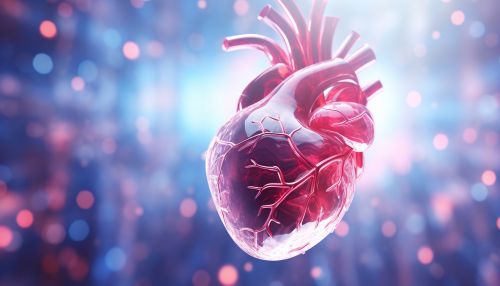Catecholaminergic polymorphic ventricular tachycardia
Overview
Catecholaminergic polymorphic ventricular tachycardia (CPVT) is a rare, potentially lethal inherited arrhythmia disorder. This condition is characterized by episodic syncope typically occurring during physical exertion or acute emotional stress. It is caused by an abnormal response to catecholamines, the hormones that increase heart rate and blood pressure during physical activity or emotional stress.


Pathophysiology
CPVT is caused by mutations in genes that encode proteins involved in the regulation of intracellular calcium handling in cardiac myocytes. The two most common genes associated with CPVT are the ryanodine receptor 2 (RYR2) gene and the calsequestrin 2 (CASQ2) gene. Mutations in these genes lead to an abnormal release of calcium from the sarcoplasmic reticulum, the calcium storage site in the cell. This abnormal calcium release can trigger ventricular arrhythmias when the levels of catecholamines are high, such as during physical activity or emotional stress.
Clinical Presentation
Patients with CPVT typically present in childhood or adolescence with episodes of syncope or cardiac arrest during physical activity or emotional stress. The resting electrocardiogram (ECG) is usually normal in these patients. However, during exercise or stress testing, patients may exhibit ventricular ectopy and bidirectional ventricular tachycardia, a characteristic arrhythmia of CPVT.
Diagnosis
The diagnosis of CPVT is based on the clinical history, the presence of characteristic arrhythmias during exercise or stress testing, and genetic testing. Genetic testing can identify mutations in the RYR2 or CASQ2 genes in approximately 60% of patients with a clinical diagnosis of CPVT. However, a negative genetic test does not exclude the diagnosis, as mutations in other genes may also cause CPVT.
Treatment
The mainstay of treatment for CPVT is the avoidance of strenuous physical activity and the use of beta-blockers, which reduce the effects of catecholamines on the heart. In some cases, patients may also require treatment with other anti-arrhythmic drugs, implantable cardioverter-defibrillator (ICD) implantation, or sympathetic denervation, a surgical procedure that reduces the release of catecholamines from the nerves supplying the heart.
Prognosis
With appropriate treatment, the prognosis for patients with CPVT is generally good. However, the condition is associated with a high risk of sudden cardiac death, particularly in untreated individuals. Regular follow-up with a cardiologist experienced in managing inherited arrhythmia syndromes is essential for these patients.
